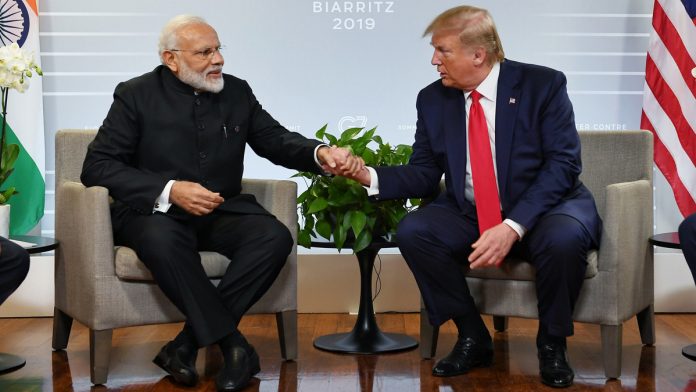SRINATH RAGHAVAN
Speaking to the press ahead of his meeting with US President Donald Trump, Prime Minister Narendra Modi said that India and Pakistan could resolve their problems bilaterally without involving “any third country”. Trump conceded the point. Against the backdrop of Trump’s repeated offers over the past month to mediate between India and Pakistan, New Delhi will be relieved. Yet, American mediation was hardly a serious prospect. Of greater concern to India is the potential erosion of the United States’ policy of “de-hyphenating” its ties with the subcontinental neighbours.
Trump’s references to mediation did cause a flutter in Delhi’s diplomatic dovecotes. Soon after his meeting with US Secretary of State Mike Pompeo on 2 August, External Affairs Minister S. Jaishankar tweeted that he had clearly conveyed “any discussion on Kashmir, if at all warranted, will only be with Pakistan and only bilaterally”. Trump’s persistence stoked further speculation, especially in Indian media. But even a nodding acquaintance with the history of American attempts at mediation would have underlined the implausibility of Trump’s avowals.
Lessons from 1963
Diplomatic mediation presupposes political leverage over the parties in dispute. Historical records show that even when the United States possessed such leverage, it was unable to compel India to consider solutions of its choosing. Take the last serious attempt mounted by the United States—under John F. Kennedy.
In the final stages of the war with China in November 1962, Jawaharlal Nehru sent a highly secret request to Kennedy, asking for 12 squadrons of US Air Force to defend Indian cities. Following China’s unilateral declaration of ceasefire, New Delhi pressed Washington for massive military aid to the tune of $1.6 billion. Even as the Kennedy administration considered India’s needs, Pakistan’s President Ayub Khan remonstrated against this turn in American policy. Ayub insisted that the United States should make its military aid conditional on India’s willingness to negotiate with Pakistan on Kashmir. Nehru initially demurred, but had little choice and had to agree to talk with Pakistan.
Following the first round of India-Pakistan talks in 1963, officials in the US State Department came up with a plan to partition the Kashmir Valley between India and Pakistan. Kennedy recognised that “Nehru is unlikely to settle Kashmir with too obvious a gun at his back”. Yet, when faced with an impasse between the two sides, the United States (along with Britain) drew up a “guidance document” proposing a partition of the Valley. Indians saw this as a complete tilt towards Pakistan. “I am convinced”, Nehru wrote to Kennedy, “that these ill-considered and ill-conceived initiatives, however, well-intentioned they may be, have at least for the present made it impossible to reach any settlement on this rather involved and complicated question.” The United States backed off.
De-hyphenating ties with India & Pakistan
The United States commands far less leverage with India now. It is inconceivable that the Modi government could have been arm-twisted into any form of mediation. The real challenge for New Delhi is in preventing any change in America’s stance of “de-hyphenating” its ties with India and Pakistan.
For the United States, “de-hyphenation” implied focusing on its relationship with India and Pakistan as distinct strands of policy—without obsessing about the state of their bilateral ties or the American role therein. Given the United States’ longstanding concern about the India-Pakistan rivalry, this was not an easy policy to espouse. But President George W. Bush threw his weight behind the idea, and so transformed the character and quality of US-India relations.
This is not to suggest that the temptation to place India and Pakistan in a single policy frame disappeared altogether. As President Barack Obama’s special representative for Afghanistan and Pakistan, Richard Holbrooke reportedly considered the possibility of including Kashmir in his ambit. New Delhi, however, scotched the idea before it took wings, pointing out that this would undo the gains made in relations with the United States.
Currently, “de-hyphenation” is in question not just because of Trump’s proclivity to shoot off his Twitter handle. Rather, he appears to be responding to developments in the region. The United States is working feverishly to conclude an agreement with the Taliban and bolt the doors behind it in Afghanistan. In its quest for a speedy exit, the Trump administration has accorded considerable importance to Pakistan in shaping the contours of the outcome. What’s more, other major powers such as China and Russia have also affirmed the centrality of Pakistan in this process. It is hardly surprising that Trump has toned down his hostile rhetoric toward Pakistan and has offered a sympathetic ear to Prime Minister Imran Khan. Pakistan’s ability to get the United States to register its concerns about India stems from the current conjuncture in South Asia.
India’s ability to resist this trend depends on its diplomatic adroitness. While it is easy to rebuff offers of mediation, it is more difficult to avoid persistent prodding to engage with Pakistan. In his tweet, S. Jaishankar spoke of talks with Pakistan “if at all warranted”. This high ground may be difficult to hold. In their meeting in France, not only did Modi refer to discussing issues with Pakistan bilaterally, but Trump told reporters “I know they [Indians] speak with Pakistan”.
It bears emphasising that “stop terror to start talks” is a policy that few Indian governments—including the first Modi government—have managed to sustain. In the current regional context, it might allow Pakistan to worm its way into the India-US relationship. Forestalling any drift towards “re-hyphenation” should be high on the Modi government’s priorities.
The author is Professor of International Relations and History at Ashoka University and a Senior Fellow at Carnegie India. Views are personal.

No comments:
Post a Comment